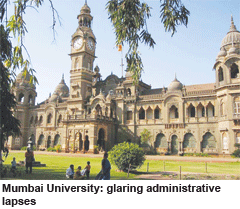The latest CAG (Comptroller and Auditor General of India) audit report on the University of Mumbai (UoM, estb. 1857) indicts the varsity’s administration for gross mismanagement, misappropriation of funds, apathetic governance, and has exposed several administrative lapses.
 Conducted between January-March last year and accessed under the Right to Information (RTI) Act by public interest activist Vihar Durve, the report says that the university management has failed to conduct audits of any department or unit during the past five years despite paying the salaries and perks of five personnel in its internal audit wing, employed for the purpose of conducting pre-audits of expenditure, physical verification of stocks, post-audit of receipts, scale regulated contingencies etc.
Conducted between January-March last year and accessed under the Right to Information (RTI) Act by public interest activist Vihar Durve, the report says that the university management has failed to conduct audits of any department or unit during the past five years despite paying the salaries and perks of five personnel in its internal audit wing, employed for the purpose of conducting pre-audits of expenditure, physical verification of stocks, post-audit of receipts, scale regulated contingencies etc.
However, Rajan Welukar, vice chan-cellor of UoM since 2010, doesn’t seem to be particularly bothered by the scathing CAG report. “The CAG report has mentioned incorrectly (sic). While we are in the process of responding to all the findings, it is incorrect to say we haven’t conducted audits. When I was appointed in July 2010, my first move was to direct that statutory audits be completed for the period 2007-2010 within six months. The audit for 2011-12 is 99 percent complete,” he says. While declining to share the latest financials, Welukar claims that UoM’s financial health has improved. “The varsity’s annual revenue has increased by 30 percent during my tenure,” he says.
Despite the vice chancellor’s nonchalance, the contents of the CAG report are damning. It says, of the varsity’s 741 affiliated colleges, with an aggregate 670,000 students, 564 haven’t been conferred permanent affiliation “indicating presence of some deficiency in colleges older than six years”.
 For instance Thadomal Shahani Engineering College, Mumbai has been granted continuation of temporary affiliation since 1983 by local inquiry committees because of deficiency of classrooms, library/laboratories and faculty. The report also suggests that since the affiliation fees income derived by UoM for continued and extended affiliation constitutes a significant portion of the Rs.29.22 crore received as affiliation fees by the university between 2006-10, it gives “an incentive to overlook the lack of facilities in colleges and continue granting affiliation on temporary basis”.
For instance Thadomal Shahani Engineering College, Mumbai has been granted continuation of temporary affiliation since 1983 by local inquiry committees because of deficiency of classrooms, library/laboratories and faculty. The report also suggests that since the affiliation fees income derived by UoM for continued and extended affiliation constitutes a significant portion of the Rs.29.22 crore received as affiliation fees by the university between 2006-10, it gives “an incentive to overlook the lack of facilities in colleges and continue granting affiliation on temporary basis”.
The report has brought to light only a fraction of the administrative lapses of the university’s management. Never-theless they are pressing and indicate how political interference has diluted the credibility of this once prestigious institution. “Some of the problems confronting UoM involve huge sums of money. Affiliation fees are levied on the basis of the number of courses a college offers. Typically a college offers at least eight-10 courses so the varsity receives crores of rupees by way of affiliation fees. Despite this the university is deeply in the red and has 365 principal and 1,319 sanctioned non-teaching posts lying vacant,” says Dr. Neeraj Hatekar, professor of economics at UoM and convenor of the Joint Action Committee for Improvement of Higher Education, which has demanded the resignation of the vice chancellor for “incompetence” across several parameters.
Unsurprisingly, this vintage varsity’s reputation is getting a hammering. In the authoritative QS World University Rankings 2013, UoM was ranked betw-een 601-650 as against its 2009 ranking in the 401-450 bracket. Moreover its reputation among employers has slipped to 249 from 198 in 2011.
Sunayana Nair (Mumbai)